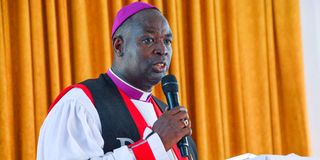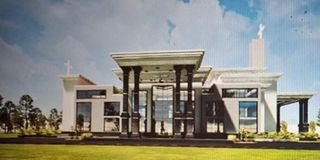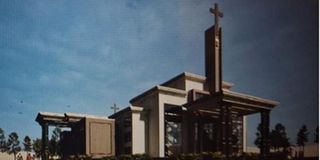Archbishop ole Sapit on State House church: Will President also be the bishop?

The Archbishop of the Anglican Church of Kenya Jackson Ole Sapit.
What you need to know:
- The construction of the church, Sapit argues, sends a wrong symbolic language.
- He also says that religious sanctuaries should be independent of political institutions.
Anglican Church of Kenya (ACK) Archbishop Jackson ole Sapit has questioned the construction of a Sh1.2 billion church at State House warning that it risks violating the constitutional principle of separation between church and State.
Archbishop ole Sapit, who is on a sabbatical leave in the United States, said he supports the construction of places of worship but objects the location of this particular church.
“I have no problem with building a place of worship. The problem is the location,” he said.
The construction of the church, he argues, sends a wrong symbolic language by potentially blurring the distinction between spiritual and state authority.
“State House is the seat of power of a human institution called the government. The Church is a sanctuary to worship God, and it is supposed to be set apart from any unholy use — representing God's kingdom,” Ole Sapit said.

The Western view in daytime of the massive church whose construction is ongoing within the grounds of State House, Nairobi.
“When you have a church in State House, which kingdom does it represent?”
He also says that religious sanctuaries should be independent of political institutions. Drawing from the example of King Solomon in the Bible, he says that he did not build the temple inside his palace but chose a different location.
Church’s denominational alignment
“Putting a church in State House is a declaration that Christianity is the state religion, against the Constitution, which defines Kenya as a secular state that embraces all religions.”
He further questioned the church’s denominational alignment and governance, wondering who would own or lead the church.

The Western entry view in daytime of the massive church whose construction is ongoing within the grounds of State House, Nairobi.
“Will the President be the bishop or leader of this church, as we have seen him recently lead public prayers?”
Archbishop Ole Sapit has also said that there are already numerous churches around the State House area that staff and residents can attend. He also raised concerns about potential security implications, noting that opening the highly protected premises for public worship could create new vulnerabilities.
“This is not a priority. We have many churches around State House where all those living there can worship. The said church will undermine the security of State House as many will come in the name of worship with other intentions,” he said.
In a rejoinder posted on social media on Saturday morning, President Ruto’s Head of Presidential Special Projects and Creative Economy, Mr Dennis Itumbi, termed Rev Ole Sapit’s argument “surprising”.
This is because, in Mr Itumbi’s view, the Anglican archbishop “should be the State House bishop”.
“When the British colonialists constructed State House, they also deliberately carved out a premium parcel of land right next to Gate A. That property is called Archbishopbourne. It wasn’t an accident. The intention was deliberate: the Archbishop of the Anglican Church was to serve as the spiritual adviser to the colonial governor, and later, to the president of the republic. That’s why Archbishopbourne sits within whispering distance of the seat of power,” Mr Itumbi wrote, adding that Rev Ole Sapit’s Nairobi residence is just next to State House.
Mr Itumbi further argued that because Kenya has never had an Anglican president, no archbishop of that church has “shed denominational identity and fully embraced the role of national chaplain”.
In fact, Mr Itumbi claimed, President Ruto’s predecessor Uhuru Kenyatta attempted to appoint a Catholic priest as a State House chaplain but the “civil service bureaucracy” did not let that role be.
“So, Your Grace, my Archbishop, Most Reverend, Ole Sapit, you don’t need to ask who should be State House bishop. By tradition, geography, and divine proximity—you already are,” stated Mr Itumbi.


